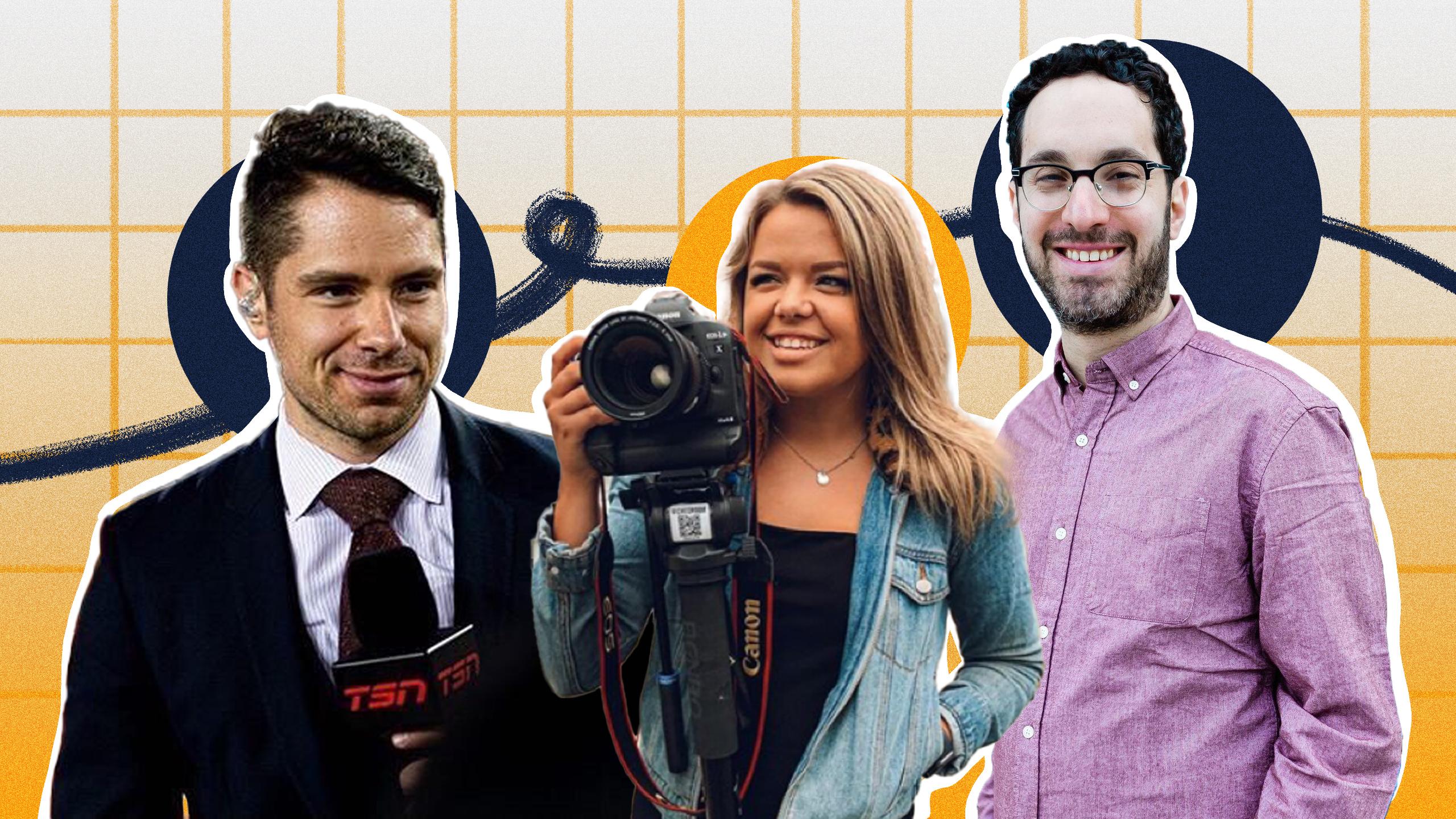By Ben Okazawa
Jesse Pollock is no stranger to putting a smile on people’s faces.
“The first job I ever did for BarDown (a completely digital TSN sub-brand), I dressed like a dinosaur and had to hold a BarDown flag in [Jurassic Park]” Pollock recalls. These days, the RTA sport media graduate is continuing to make sports fans laugh.
The only difference is that, now, he’s doing it from behind a screen.
On March 11, the sports world was sent into a frenzy when the NBA announced it was postponing the remainder of the 2019-20 season to prevent the spread of COVID-19. Within days, all of the major sports leagues around the world followed suit.
Despite the new challenges, there were a few unsung heroes who worked tirelessly to provide people with a sense of normalcy during the early stages of the pandemic.
Matthew Scianitti has continued to work hard throughout his career. Scianitti, who graduated from Ryerson’s masters of journalism program, currently works as a TSN reporter. “I went almost a whole year without a day off,” said Scianitti of his early days at TSN.
Now, in the midst of league shutdowns, he says adaptability is key. “You have to make yourself flexible and show a willingness to try different things,” said Scianitti. “[If you don’t], you’re waiting to get fired.”
Traditionally covering the CFL, Scianitti has been reporting on the NFL and other leagues during the pandemic after the league announced the cancellation of its season.
Many might think sports reporting would be made more difficult by physical distancing. Sarah Jenkins, who graduated from Ryerson’s sport media program in 2018, has seen a silver lining. “[The pandemic] has just changed the dynamic,” said the CBC producer, “We can talk to anyone, about anything, [who is] anywhere now.”
For sports journalists, a lack of media access has acted as somewhat of a catalyst, forcing them to try new things and interview people they otherwise never would’ve thought of approaching.
Pollock didn’t experience that same uncertainty that so many people did during the early stages of quarantine. As a producer of digital content for BarDown, described by Media in Canada as TSN’s “fast-paced and youthful” online counterpart, he thinks he and his team were actually busier without sports.
“I think people craving sports content relied on BarDown,” said Pollock of the league hiatuses, “We [knew it was] a tough time and people need to be entertained.”
Recognizing that people needed a break from reality, Pollock spoke of a pressure to continue being creative and producing content. BarDown has accumulated hundreds of thousands of followers across different social media platforms. But, that pressure has turned into a motivator for Pollock during league shutdowns, and the BarDown team produced regular sports content because of it.
Eric Koreen can relate to that feeling of pressure. In university, he spent many days toiling away in the Rogers Communications Centre as a journalism student. Now, Koreen is one of two writers covering the Toronto Raptors for The Athletic. He travels with the team across the continent, writing news, opinion, and feature stories for “Canada’s Team.” As someone who would normally be with the Raptors during the season, the NBA’s no-exit, no-entry bubble in Orlando put Koreen in a tough spot as a writer.
Koreen has real concerns about the pandemic’s effect on sports media. Although others have found virtual interviews to be more convenient and accessible, Koreen believes that there is no real substitute for interpersonal connection. “It became very difficult to write personality-based features, just because there wasn’t the time, there wasn’t the opportunity or access to do that,” he said.
Koreen’s biggest worry though is that these Zoom interviews won’t stop when the threat of COVID-19 ends. “I definitely felt that my range was limited by the type of access we had,” he said, “[But] why should [sports leagues] be making one-on-one interviews accessible before games?” Koreen believes that leagues may try to capitalize on the current pandemic to continue to limit media access for their convenience.
Scianitti, Jenkins, and Pollock all expect virtual interviews to be much more prevalent in sports media down the line, even post-pandemic.
Another point everyone can agree on? They miss reporting on live sports.
“There’s a moment that happens right before a game gets started,” says Scianitti, “Where you’re looking around and you realize our planet might be a speck of sand in a galactic ocean… but what these athletes are about to do is the most important thing.”
Sports media is an ever-changing landscape and the COVID-19 pandemic has made the industry adapt in order to survive. Ryerson alumni have been leading the charge, bending—but, not breaking—to these unprecedented circumstances.













Leave a Reply